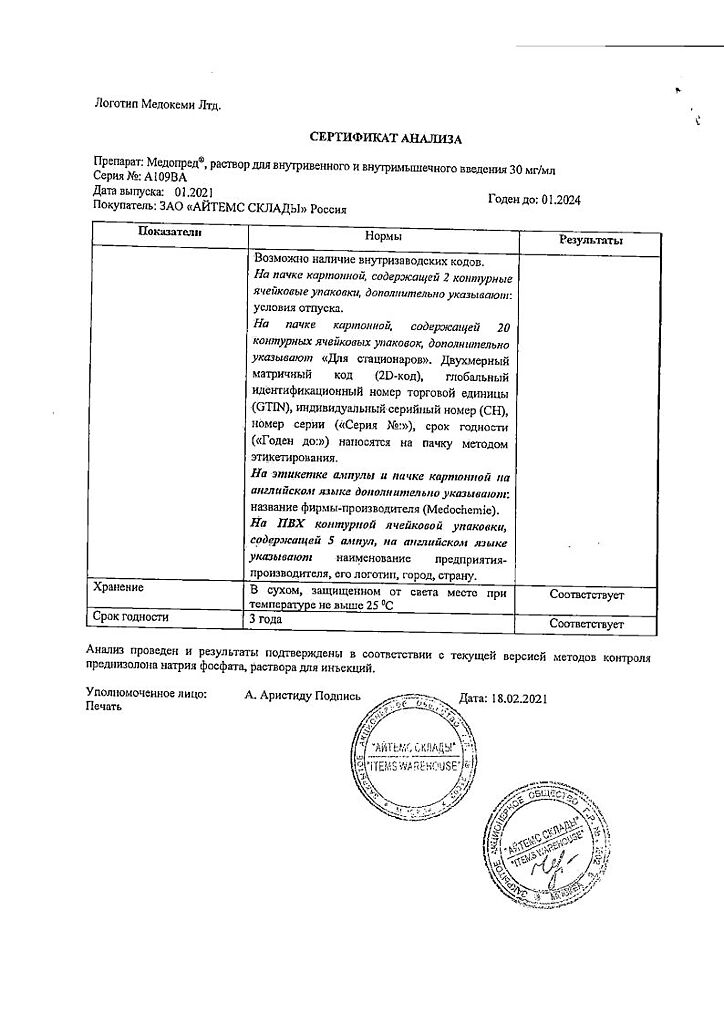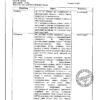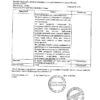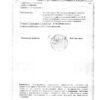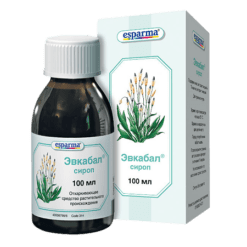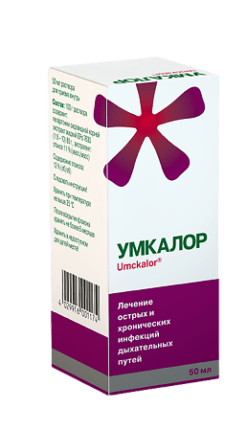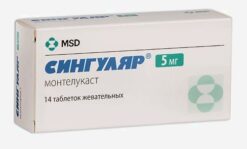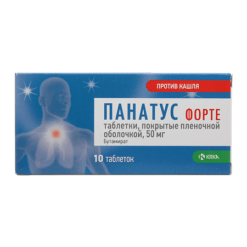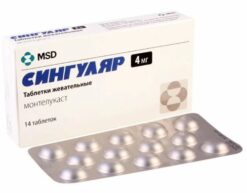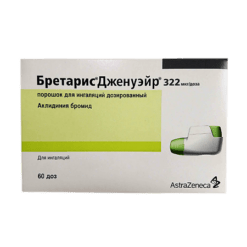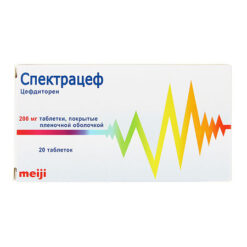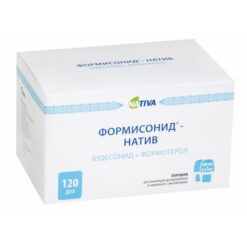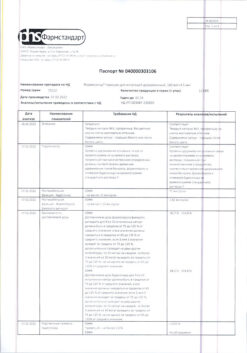No products in the cart.
Medopred, 30 mg/ml 1 ml 10 pcs
€1.00
Out of stock
(E-mail when Stock is available)
Description
Medopred is used for emergency therapy in conditions requiring rapid increase in the concentration of glucocorticosteroids in the body:
- Shock (burn, traumatic, surgical, toxic) – when vasoconstrictors, plasma substitute drugs and other symptomatic therapy are ineffective;
- Allergic reactions (acute severe forms), hemotransfusion shock, anaphylactic shock, anaphylactoid reactions;
- Brain edema (including.ч.
- Bronchial asthma (severe form), asthmatic status;
- Systemic connective tissue diseases (systemic lupus erythematosus, rheumatoid arthritis);
- Acute adrenal insufficiency;
- Thyrotoxic crisis;
- Acute hepatitis, hepatic coma;
- Limiting inflammation and prevention of scarring (in poisoning with cauterizing fluids).
.
Indications
Indications
Medopred is used for emergency therapy for conditions requiring a rapid increase in the concentration of glucocorticosteroids in the body:
Shock (burn, traumatic, surgical, toxic) – when vasoconstrictors, plasma replacement drugs and other symptomatic therapy are ineffective;
Allergic reactions (acute severe forms), blood transfusion shock, anaphylactic shock, anaphylactoid reactions;
Brain edema (including due to a brain tumor or associated with surgery, radiation therapy or head trauma);
Bronchial asthma (severe form), status asthmaticus;
Systemic connective tissue diseases (systemic lupus erythematosus, rheumatoid arthritis);
Acute adrenal insufficiency;
Thyrotoxic crisis;
Acute hepatitis, hepatic coma;
Reducing inflammation and preventing cicatricial contractions (in case of poisoning with cauterizing liquids).
Special instructions
Special instructions
During treatment with Medopred (especially long-term), observation by an ophthalmologist, monitoring of blood pressure, water and electrolyte balance, as well as peripheral blood patterns and blood glucose levels are necessary.
In order to reduce side effects, antacids can be prescribed, as well as increasing the intake of K+ into the body (diet, potassium supplements). Food should be rich in proteins, vitamins, and limit the content of fats, carbohydrates and table salt.
The effect of the drug is enhanced in patients with hypothyroidism and liver cirrhosis.
The drug may worsen existing emotional instability or psychotic disorders. If a history of psychosis is indicated, Medopred is prescribed in high doses under the strict supervision of a physician.
Active ingredient
Active ingredient
Prednisolone
Composition
Composition
1 ampoule contains:
Active substance:
prednisolone sodium phosphate in terms of prednisolone phosphate-30 mg
Excipients:
nicotinamide,
disodium edetate,
sodium disulfite,
phenol,
sodium hydroxide,
water for injections.
Contraindications
Contraindications
For short-term use for health reasons, the only contraindication is hypersensitivity to Medopred or the components of the drug.
In children during the growth period, GCS should be used only for absolute indications and under the careful supervision of the attending physician.
The drug should be prescribed with caution for the following diseases and conditions:
Diseases of the gastrointestinal tract – peptic ulcer of the stomach and duodenum, esophagitis, gastritis, acute or latent peptic ulcer, recently created intestinal anastomosis, ulcerative colitis with the threat of perforation or abscess formation, diverticulitis.
Parasitic and infectious diseases of a viral, fungal or bacterial nature (currently or recently suffered, including recent contact with a patient) – herpes simplex, herpes zoster (viremic phase), chicken pox, measles; amebiasis, strongyloidiasis; systemic mycosis; active and latent tuberculosis. Use for severe infectious diseases is permissible only against the background of specific therapy.
Pre- and post-vaccination period (a period of 8 weeks before and 2 weeks after vaccination), lymphadenitis after BCG vaccination. Immunodeficiency conditions (including AIDS or HIV infection).
Diseases of the cardiovascular system, incl. recent myocardial infarction (in patients with acute and subacute myocardial infarction, the necrosis focus may spread, the formation of scar tissue may slow down and, as a result, the heart muscle will rupture), severe chronic heart failure, arterial hypertension, hyperlipidemia.
Endocrine diseases – diabetes mellitus (including impaired carbohydrate tolerance), hyperthyroidism, hypothyroidism, Itsenko-Cushing’s disease, obesity (III-IV stage).
Severe chronic renal and/or liver failure, nephrourolithiasis. Hypoalbuminemia and conditions predisposing to its occurrence (liver cirrhosis, nephrotic syndrome).
Systemic osteoporosis, myasthenia gravis, acute psychosis, poliomyelitis (except for the form of bulbar encephalitis), open- and closed-angle glaucoma,
Pregnancy.
Side Effects
Side Effects
The incidence and severity of side effects depend on the duration of use, the size of the dose used and the ability to comply with the circadian rhythm of Medopred’s administration.
When using Medopred, the following may occur:
From the endocrine system: decreased glucose tolerance, steroid diabetes mellitus or manifestation of latent diabetes mellitus, suppression of adrenal function, Itsenko-Cushing syndrome (moon-shaped face, pituitary-type obesity, hirsutism, increased blood pressure, dysmenorrhea, amenorrhea, muscle weakness, stretch marks), delayed sexual development in children.
From the digestive system: nausea, vomiting, pancreatitis, steroid ulcer of the stomach and duodenum, erosive esophagitis, gastrointestinal bleeding and perforation of the wall of the gastrointestinal tract, increased or decreased appetite, indigestion, flatulence, hiccups. In rare cases, increased activity of liver transaminases and alkaline phosphatase.
From the cardiovascular system: arrhythmias, bradycardia (up to cardiac arrest); development (in predisposed patients) or increased severity of heart failure, changes in the electrocardiogram characteristic of hypokalemia, increased blood pressure, hypercoagulation, thrombosis. In patients with acute and subacute myocardial infarction – the spread of necrosis, slowing down the formation of scar tissue, which can lead to rupture of the heart muscle.
From the nervous system: delirium, disorientation, euphoria, hallucinations, manic-depressive psychosis, depression, paranoia, increased intracranial pressure, nervousness or anxiety, insomnia, dizziness, vertigo, pseudotumor of the cerebellum, headache, convulsions.
From the senses: posterior subcapsular cataract, increased intraocular pressure with possible damage to the optic nerve, a tendency to develop secondary bacterial, fungal or viral eye infections, trophic changes in the cornea, exophthalmos, sudden loss of vision (with parenteral administration in the head, neck, nasal turbinates, scalp, deposition of drug crystals in the vessels of the eye is possible). Metabolic: increased calcium excretion, hypocalcemia, weight gain, negative nitrogen balance (increased protein breakdown), increased sweating.
Caused by mineralocorticoid activity – fluid and sodium retention (peripheral edema), hypernatremia, hypokalemic syndrome (hypokalemia, arrhythmia, myalgia or muscle spasm, unusual weakness and fatigue).
From the musculoskeletal system: slowing of growth and ossification processes in children (premature closure of the epiphyseal growth plates), osteoporosis (very rarely – pathological bone fractures, aseptic necrosis of the head of the humerus and femur), rupture of muscle tendons, steroid myopathy, decrease in muscle mass (atrophy).
On the part of the skin and mucous membranes: delayed wound healing, petechiae, ecchymoses, thinning of the skin, hyper- or hypopigmentation, steroid acne, stretch marks, a tendency to develop pyoderma and candidiasis.
Allergic reactions: skin rash, itching, anaphylactic shock, local allergic reactions.
Local for parenteral administration: burning, numbness, pain, tingling at the injection site, infection at the injection site, rarely – necrosis of surrounding tissues, scarring at the injection site; atrophy of the skin and subcutaneous tissue with intramuscular injection (injection into the deltoid muscle is especially dangerous).
Other: development or exacerbation of infections (the appearance of this side effect is facilitated by jointly used immunosuppressants and vaccination), leukocyturia, withdrawal syndrome.
Interaction
Interaction
Pharmaceutical incompatibility of Medopred with other intravenously administered drugs is possible – it is recommended to administer it separately from other drugs (iv bolus, or through another dropper, as a second solution). When mixing Medopred solution with heparin, a precipitate forms.
With long-term therapy, Medopred can increase the content of folic acid.
The simultaneous administration of Medopred with: inducers of “liver” microsomal enzymes (phenobarbital, rifampicin, phenytoin, theophylline, ephedrine) leads to a decrease in its concentration;
diuretics (especially “thiazide” and carbonic anhydrase inhibitors) and amphotericin B – can lead to increased excretion of K+ from the body and an increased risk of developing heart failure;
with sodium-containing drugs – to the development of edema and increased blood pressure;
cardiac glycosides – their tolerability worsens and the likelihood of developing ventricular extrasystoles increases (due to caused hypokalemia);
indirect anticoagulants – weakens (less often enhances) their effect (dosage adjustment required);
anticoagulants and thrombolytics – the risk of bleeding from ulcers in the gastrointestinal tract increases;
ethanol and non-steroidal anti-inflammatory drugs (NSAIDs) – increases the risk of erosive and ulcerative lesions in the gastrointestinal tract and the development of bleeding (in combination with NSAIDs in the treatment of arthritis, it is possible to reduce the dose of glucocorticosteroids due to the summation of the therapeutic effect);
paracetamol – the risk of developing hepatotoxicity increases (induction of liver enzymes and the formation of a toxic metabolite of paracetamol);
acetylsalicylic acid – accelerates its elimination and reduces its concentration in the blood (when Medopred is discontinued, the level of salicylates in the blood increases and the risk of side effects increases);
insulin and oral hypoglycemic drugs, antihypertensive drugs – their effectiveness decreases;
vitamin D – its effect on the absorption of Ca2+ in the intestine is reduced; growth hormone – reduces the effectiveness of the latter, and with praziquantel – its concentration in the blood;
m-anticholinergic blockers (including antihistamines and tricyclic antidepressants) and nitrates – helps increase intraocular pressure;
tricyclic antidepressants – may increase the severity of depression caused by taking glucocorticosteroids (not indicated for the treatment of these side effects).
isoniazid and mexiletine – increases their metabolism (especially in “slow” acetylators), which leads to a decrease in their plasma concentrations.
Carbonic anhydrase inhibitors and loop diuretics may increase the risk of osteoporosis.
Indomethacin, displacing prednisolone from its connection with albumin, increases the risk of developing its side effects.
ACTH enhances the effect of Medopred.
Ergocalciferol and parathyroid hormone prevent the development of osteopathy caused by Medopred.
Cyclosporine and ketoconazole, by slowing down the metabolism of Medopred, can in some cases increase its toxicity.
The simultaneous administration of androgens and steroidal anabolic drugs with Medopred promotes the development of peripheral edema and hirsutism, and the appearance of acne.
Estrogens and oral estrogen-containing contraceptives reduce the clearance of Medopred, which may be accompanied by an increase in the severity of its action.
When used simultaneously with live antiviral vaccines and against the background of other types of immunizations, it increases the risk of viral activation and the development of infections.
Antipsychotics (neuroleptics) and azathioprine increase the risk of developing cataracts when prescribed Medopred.
The simultaneous administration of antacids reduces the absorption of Medopred.
When used simultaneously with antithyroid drugs, the clearance of Medopred decreases and with thyroid hormones increases.
Hypokalemia caused by glucocorticosteroids can increase the severity and duration of muscle blockade due to muscle relaxants.
Mitotane and other inhibitors of adrenal function may necessitate an increase in the dose of prednisolone.
Immunosuppressants increase the risk of developing infections and lymphoma or other lymphoproliferative disorders associated with the Epstein-Barr virus.
Overdose
Overdose
The side effects described above may increase. It is necessary to reduce the dose of Medopred. Treatment is symptomatic.
Manufacturer
Manufacturer
Medokemi Ltd, Cyprus
Additional information
| Manufacturer | Medokemi Ltd, Cyprus |
|---|---|
| Medication form | solution |
| Brand | Medokemi Ltd |
Related products
Buy Medopred, 30 mg/ml 1 ml 10 pcs with delivery to USA, UK, Europe and over 120 other countries.



